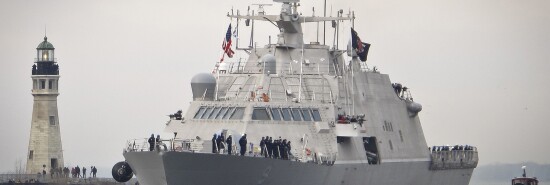
New ammunition to sink the Littoral Combat Ship
Tom Rogan
Video Embed
It should have been abandoned years ago, but the Navy’s Littoral Combat Ship somehow survives. This bears note as Congress returns from its recess looking to pass the 2024 National Defense Authorization Act.
Top line: Washington should finally give up the ship when it comes to this floating detritus.
BIDEN THROWS GAS ON INFLATION FIRE
The problem is clear. The Navy needs ships that can fight and survive when outnumbered against Chinese air, missile, and naval forces that are operating close to the Chinese mainland. This is not a mission requirement that the LCS can fulfill. Not by a long shot. Instead, the LCSs are underarmed, underpowered monstrosities that break down as much as they sail. Each LCS costs hundreds of millions of dollars simply to offer the People’s Liberation Army a good chance to make a new coral reef.
Suggestions that the LCSs could be used to transport Marines or deploy drones are laughable. Even if the LCSs didn’t break down in the middle of a war zone, their crews and embarked Marines would be highly vulnerable to PLA targeting and thus to being killed by concussive blast, burned to death, or drowned. Drones are useless unless they can get close to a fight, which the LCS could not. The Navy openly admits as much, saying it would not deploy these ships during any war over Taiwan or in the South China Sea. Selling the LCSs to other nations might make sense, except for the fact that those nations could buy far cheaper, better alternatives from nations that still know how to build warships on time and at cost.
Unfortunately, it is more likely than not that Congress will reject the Navy’s request to rid itself of America’s kryptonite hulks. Too many members of Congress, such as Sen. Tammy Baldwin (D-WI), Reps. John Rutherford (R-FL), Kay Granger (R-TX), and Rob Wittman (R-VA), put local cronyism before national security. Even Rep. Mike Gallagher (R-WI) who has otherwise done strong work heading up the China Select Committee has supported the vessel (Gallagher’s office did not respond to a Washington Examiner request for comment as to whether he still supports the LCS).
Americans should hold their elected officials’ feet to the fire.
Fortunately, they now have some more ammunition to do so. On Thursday, ProPublica extensively documented the LCS’s debacle in its development and deployment. It reports a litany of stunning failures of varied and sometimes ludicrous nature. The investigative news outlet also shows how many Navy crews haven’t exactly enjoyed serving on these ships. As one former officer who served on a number of different LCSs, Lt. Jeff Watson, put it, “I would hesitate to say we ever did a mission.” Watson says he and his shipmates spent most of their time trying to fix broken systems at port without adequate support from their host commands.
That Navy command failure goes further. ProPublica offers strong indications that former Vice Chief of Naval Operations Adm. Mark Ferguson and former Chief of Naval Operations Adm. Jonathan Greenert unjustly punished subordinates for telling the truth about how bad the LCS was. This reflects a broader disgraceful trend in the Navy where admirals rush to punish mid-ranking officers for perceived failures, but are very rarely held accountable for their own failings. Did Ferguson and Greenert prioritize keeping their boss and Congress happy before the needs of their service?
ProPublica also explains how the LCS was saved against all the evidence in favor of its sacrifice. Its salvation centered on former Navy Secretary Ray Mabus and former senators like Carl Levin and Richard Shelby. Late Sen. John McCain saw the writing on the wall, recognizing the LCS’s inadequacy. But Mabus wanted ships, regardless if they worked or not. And members of Congress wanted construction contracts for their states. Prudent governance was not on display. Indeed, we learn how Sen. Tammy Baldwin (D-WI) fought to save the LCS class. Baldwin told ProPublica she is proud of this because the LCS “provided new capabilities and capacity to the Navy.” Unless, however, Baldwin means the “new capability” of breaking down all the time and the “new capacity” for subsurface graveyards, her statement is a masterpiece of fiction.
Sadly, Baldwin’s indirect effort to enable the PLA is not yet concluded. Supported by other members of Congress such as Sen. Tim Kaine (D-VA), Baldwin recently passed an amendment that will make it slower and more expensive for the Navy to build ships that can actually fight and survive the PLA. Brilliant.
Some in Congress say that the LCS is better than nothing. But even that’s not true. These ships drain crews, port facilities, maintenance teams/schedules, and budgets from assets that might actually be able to fight and win. The LCS?
Do give up the ship.
